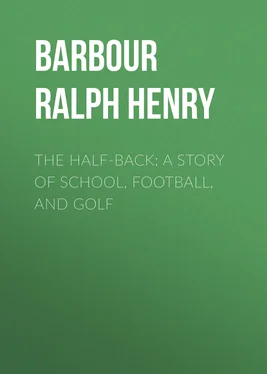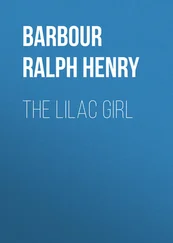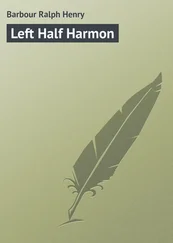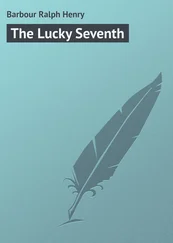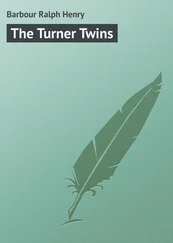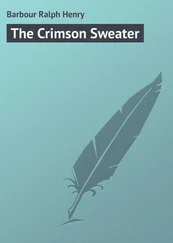Ralph Barbour - The Half-Back - A Story of School, Football, and Golf
Здесь есть возможность читать онлайн «Ralph Barbour - The Half-Back - A Story of School, Football, and Golf» — ознакомительный отрывок электронной книги совершенно бесплатно, а после прочтения отрывка купить полную версию. В некоторых случаях можно слушать аудио, скачать через торрент в формате fb2 и присутствует краткое содержание. Жанр: foreign_children, foreign_antique, foreign_prose, на английском языке. Описание произведения, (предисловие) а так же отзывы посетителей доступны на портале библиотеки ЛибКат.
- Название:The Half-Back: A Story of School, Football, and Golf
- Автор:
- Жанр:
- Год:неизвестен
- ISBN:нет данных
- Рейтинг книги:5 / 5. Голосов: 1
-
Избранное:Добавить в избранное
- Отзывы:
-
Ваша оценка:
- 100
- 1
- 2
- 3
- 4
- 5
The Half-Back: A Story of School, Football, and Golf: краткое содержание, описание и аннотация
Предлагаем к чтению аннотацию, описание, краткое содержание или предисловие (зависит от того, что написал сам автор книги «The Half-Back: A Story of School, Football, and Golf»). Если вы не нашли необходимую информацию о книге — напишите в комментариях, мы постараемся отыскать её.
The Half-Back: A Story of School, Football, and Golf — читать онлайн ознакомительный отрывок
Ниже представлен текст книги, разбитый по страницам. Система сохранения места последней прочитанной страницы, позволяет с удобством читать онлайн бесплатно книгу «The Half-Back: A Story of School, Football, and Golf», без необходимости каждый раз заново искать на чём Вы остановились. Поставьте закладку, и сможете в любой момент перейти на страницу, на которой закончили чтение.
Интервал:
Закладка:
"But I thought Mr. Remsen was not coming until Saturday?"
"That," replied West, confidentially, "was his intention, but he heard of a youngster up here who is such an astonishingly fine punter that he decided to come at once and see for himself; and so he telegraphed to Blair this morning. And you and I, my lad, will March–see?–with the procession, and sing–"
"'Hilltonians, Hilltonians, your crimson banner fling
Unto the breeze, and 'neath its folds your anthem loudly sing!
Hilltonians! Hilltonians! we stand to do or die,
Beneath the flag, the crimson flag, that waves for victory!'"
And, seizing Joel by the arm, West dragged him out of the corridor and down the steps into the warm sunlight of a September noon, chanting the school song at the top of his voice. A group of boys on the Green shouted lustily back, and the occupant of a neighboring window threw a cushion with unerring precision at West's head. Stopping to deposit this safely amid the branches halfway up an elm tree, the two youths sped across the yard toward Warren Hall and the dinner table.
"You sit at our table, March," announced West. "Digbee's away, and you can have his seat. Come on." Joel followed, and found himself in the coveted precincts of the Hampton House table, and was introduced to five youths, who received him very graciously, and invited him to partake of such luxuries as pickled walnuts and peach marmalade. Joel was fast making the discovery that to be vouched for by Outfield West invariably secured the highest consideration.
"I've been telling March here that it is his bounden duty to go to the station," announced West to the table at large.
"Of course it is," answered Cooke and Cartwright and Somers, and two others whose names Joel did not catch. "The wealth, beauty, and fashion will attend in a body," continued Cooke, a stout, good-natured-looking boy of about nineteen, who, as Joel afterward learned, was universally acknowledged to be the dullest scholar in school. "Patriotism and–er–school spirit, you know, March, demand it." And Cooke helped himself bountifully to West's cherished bottle of catsup.
"This is Remsen's last year as coach, you see," explained West, as he rescued the catsup. "I believe every fellow feels that we ought to show our appreciation of his work by turning out in force. It's the least we can do, I think. Mind you, I don't fancy football a little bit, but Remsen taught us to win from St. Eustace last year, and any one that helps down Eustace is all right and deserves the gratitude of the school and all honest folk."
"Hear! hear!" cried Somers.
"I'd like very well to go," said Joel, "but I've got a recitation at two." Cooke looked across at him sorrowfully.
"Are you going in for study?" he asked.
"I'm afraid so," answered Joel laughingly.
"My boy, don't do it. There's nothing gained. I've tried it, and I speak from sad experience."
"But how do you get through?" questioned Joel.
"I will tell you." The stout youth leaned over and lowered his voice to a confidential whisper. "I belong to the same society as 'Wheels,' and he doesn't dare expel me."
"I wish," said Joel in the laugh that followed, "that I could join that society."
"Easy enough," answered Cooke earnestly. "I will put your name up at our next meeting. All you have to do is to forget all the Greek and Latin and higher mathematics you ever knew, give your oath never to study again, and appear at chapel two consecutive mornings in thigh boots and a plaid ulster."
Despite West's pleas Joel refused to "cut" his recitation, promising, however, to follow to the station as soon as he might.
"It's only a long mile," West asserted. "If you cut across Turner's meadow you'll make it in no time. And the train isn't due until three. You'll see me standing on the truck." And so Joel had promised, and later, from the seclusion of the schoolroom, which to-day was well-nigh empty, had heard the procession take its way down the road, headed by the school band, which woke the echoes with the brave strains of the Washington Post March.
To-day the Aeneid lost much of its interest, and when the recitation was over Joel clapped his new brown felt hat on his head–for West had conducted him to the village outfitter the preceding day–and hurried up to his room to leave his book and pad. "Dickey" Sproule was stretched out upon the lounge–a piece of personal property of which he was very proud–reading Kenilworth.
"Hello!" cried Joel, "why aren't you over at the lab? Isn't this your day for exploding things?" Sproule looked up and yawned.
"Oh, I cut it. What's the good of knowing a lot of silly chemistry stuff when you're going to be an author?"
"I should say it might be very useful to you; but I've never been an author, and perhaps I'm mistaken. Want to go to the station?"
"What, to meet that stuck-up Remsen? I guess not. Catch me walking a mile and a half to see him!"
"Well, I'm going," answered Joel. An inarticulate growl was the only response, and Joel took the stairs at leaps and bounds, and nearly upset Mrs. Cowles in the lower hall.
"Dear me, Mr. March!" she exclaimed, as together they gathered up a load of towels, "is it only you, then? I thought surely it was a dozen boys at least."
"I'm very sorry," laughed Joel. "I'm going to the station. Mr. Remsen is coming, you know. Have I spoiled these?"
"No, indeed. So Mr. Remsen's coming. Well, run along. I'd go myself if I wasn't an old woman. I knew Mr. Remsen ten years ago, and a more bothersome lad we never had. He had Number 15, and we never knew what to expect next. One week he'd set the building on fire with his experiments, and the next he'd break all the panes in the window with his football. But then he was such a nice boy!" And with this seemingly contradictory statement the Matron trudged away with her armful of towels, and Joel took up his flight again, across the yard to Academy Road, and thence over the fence into Turner's meadows, where the hill starts on its rise to the village. Skirting the hill, he trudged on until presently the station could be seen in the distance. And as he went he reviewed the five days of his school existence.
He remembered the strange feeling of loneliness that had oppressed him on his arrival, when, just as the sun was setting over the river, he had dropped down from the old stage coach in front of Academy Hall, a queer-looking, shabbily dressed country boy with a dilapidated leather valise and a brown paper parcel almost as big. He remembered the looks of scorn and derision that had met him as he had taken his way to the office, and, with a glow at his heart, the few simple, kindly words of welcome and the firm grasp of the hand from the Principal. Then came the first day at school, with the dread examinations, which after all turned out to be fairly easy, thanks to Joel's faculty for remembering what he had once learned. He remembered, too, the disparaging remarks of "Dickey" Sproule, who had predicted Joel's failure at the "exams.". "Who ever heard," Sproule had asked scornfully, "of a fellow making the upper middle class straight out of a country grammar school, without any coaching?" But when the lists were posted, Joel's name was down, and Sproule had taken deep offense thereat. "The school's going to the dogs," he had complained. "Examinations aren't nearly as hard as they were when I entered."
The third day, when he had kicked that football down the field, and, later, had made the acquaintance of Outfield West, seemed now to have been the turning point from gloom to sunshine. Since then Joel had changed from the unknown, derided youth in the straw hat to some one of importance; a some one to whom the captain of the school eleven spoke whenever they met, a chum of the most envied boy in the Academy, and a candidate for the football team for whom every fellow predicted success.
Читать дальшеИнтервал:
Закладка:
Похожие книги на «The Half-Back: A Story of School, Football, and Golf»
Представляем Вашему вниманию похожие книги на «The Half-Back: A Story of School, Football, and Golf» списком для выбора. Мы отобрали схожую по названию и смыслу литературу в надежде предоставить читателям больше вариантов отыскать новые, интересные, ещё непрочитанные произведения.
Обсуждение, отзывы о книге «The Half-Back: A Story of School, Football, and Golf» и просто собственные мнения читателей. Оставьте ваши комментарии, напишите, что Вы думаете о произведении, его смысле или главных героях. Укажите что конкретно понравилось, а что нет, и почему Вы так считаете.
